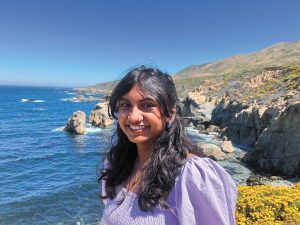 FFRF awarded Daksha $3,000.
FFRF awarded Daksha $3,000.
By Daksha Pillai
The time I spend contemplating God isn’t during a church service, temple puja, or early salah — it’s during a debate round. Rather than being an ineffable truth, God exists for me as an idea to be interrogated. I have spent hours dissecting what collegiate debaters call the 3-O God (omnipotent, omnipresent, omniscient), offering support for its existence through the ontological and cosmological proofs, rebutting it with the problem of evil, and promptly forgetting whatever position I held by the next round.
But there is one argument that has stuck with me through all of these debates — Pascal’s wager. Proposed by French mathematician Blaise Pascal, the “wager” is the idea that if God doesn’t exist, there are no consequences for the believer, whereas if God does exist, the believer is promised eternal pleasure in an afterlife. From this cost-benefit analysis, it becomes clear that religious belief is the best choice an individual can make in this spiritual gamble. If this is the case, why am I and so many other young people acting against our best interests by rejecting religion?
Growing up in the 21st century means bearing witness to the cost that Pascal’s wager does not account for — the harm that organized religion creates in communities. Every day, we read headlines of sectarian violence around the world, scroll through testimonials of ex-believers, and hear our loved ones being demonized by religious leaders. Thus, we understand that religious affiliation doesn’t just affect our own spiritual journeys, it means supporting structures that impede progress on a global scale.
Furthermore, these structures have been increasingly using the power of the judiciary to impose their dogma onto others. Earlier this year, the Alabama Supreme Court invoked “the wrath of God” as a justification for declaring frozen embryos had legal rights, a decision that imperiled families undergoing fertility treatments, as well as unforgivably blurred the lines between church and state. Even at the highest levels of the law, religious influence abounds, such as when the “Appeal to Heaven” flag, a symbol of Christian nationalism, was flown outside of the house of Supreme Court Justice Samuel Alito. While religious authorities take great pains to depict their believers as noble underdogs, it has become clear that they exist at the highest echelons of power. No one is in a better position to recognize this than the Gen-Z’ers who are having their autonomy restricted by these Goliaths.
In addition to resenting how doctrine determines policy, many of us also understand the folly of waiting for an omnipotent entity to save us from our own actions. As climate change ravages communities with sweltering heat waves and destructive flash floods, sitting members of Congress have cited passages from the bible as evidence that our inaction is ordained. As school shootings become terrifyingly common, gun violence is still met with “thoughts and prayers’’ rather than policy proposals.
This avoidance is appalling to me and other teenagers who have marched in the streets for fossil fuel divestment and sheltered in place during active shooter drills. I believe that religion at its best can act as a comfort during challenging times. However, as this comfort morphs into apathy, relying on a higher power means failing to use our own power, exacerbating these challenges for future generations.
Some pollsters may look at the declining religiosity among Generation Z as a symptom of our youth, an anti-establishment costume that will be shed when we enter “the real world.” Instead, I would argue that rejecting religion is evidence of our heightened sense of responsibility to our community. Rather than blindly accept the structures around us, we are interrogating the ideas that have propagated injustice and are setting them aside. Instead of believing out of self-preservation, I and many other young people are walking away from the wager, making our own path to a safe, secular world.
Daksha, 18, is from Lexington, Ky., and attends Columbia University, where she is majoring in political science and economics.”
“I have a strong passion for community-building, as well as public speaking, with the latter being informed by my prolific high school and collegiate debate career,” Daksha writes. “At Columbia, I continue to search for different perspectives as a senior staff writer at the Columbia Daily Spectator.”
